The Gazans may be too scared to speak publicly against Hamas, but the hatred is seen & felt, and they haven’t forgotten that protests from their compatriots during Israel’s Operation Protective Edge, were conspicuous in their absence.
By Francesca Borri
In the time that has elapsed since the end of the war, Gaza has been trying to return to normal – if you can ever call life in Gaza normal. But under the surface, the suppressed emotions are bubbling.
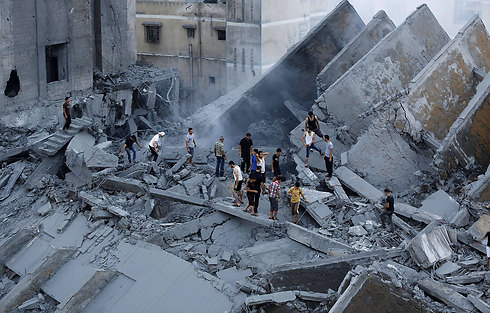
Central Gaza building hit by the IDF during Protective Edge – Photo: AFP
The tap water is the same salty sea brine – there has been no potable water coming out of the taps in Gaza for a very long time. The grocery stores are half empty. Cookies, tea and eggs – and little more – sit on dusty shelves. The boxes are arranged in such a way so as to fill up as much space as possible and hide the scarcity.
The residents can still hear the hum of the UAVs, constantly and without respite. Living in Gaza feels like living inside a beehive. But at least now you don’t have to flee the bombs that fell without any warning. Now, many residents are faced with a different problem – how to avoid Hamas.
The twenty-something youths from the “March 15” movement, who, inspired by what they saw in Tahrir Square, tried to bring Palestinian Spring to Gaza and the West Bank, are calling the situation in the Strip the “double occupation.”
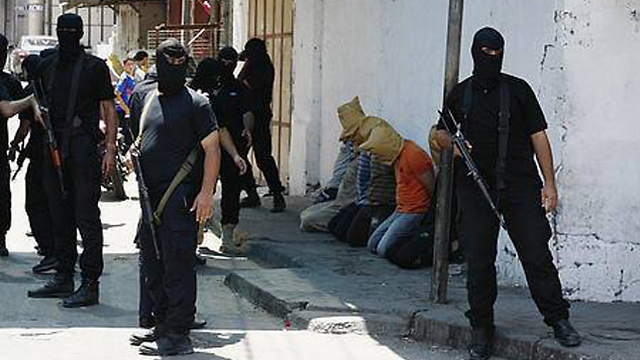
Hamas post Gaza operation executions
They find themselves trapped in a vice between the Israeli military and the Hamas regime. They say that you can’t blame everything on Israel. After it publicly executed in the city square 18 people accused of spying for Israel, Hamas pressed on with its crackdown on collaborators, arresting hundreds of Fatah activists and others who were opposed to the Hamas rule.
What’s the point?
Everyone in Gaza is too frightened to speak. It’s no wonder. Gaza is so small that maintaining anonymity is complicated and perilous. Any small detail could help uncover those who dared utter criticism to foreign journalists.
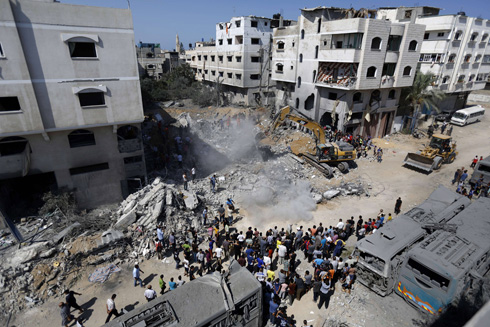
The wreckage at the site of Deif’s assassination attempt – Photo: AFP
Hamas can easily track the network of contacts a foreign journalist has in the Strip within just a few hours. Yet even though interviews with Gazan willing to pass criticism are almost impossible to conduct out in the open, the atmosphere on the streets leaves no doubt as to how people really feel.
From the greengrocer to the taxi driver, from the doctor to the student, each throws out a sentence or a phrase expressing their harsh feelings about living in Gaza. But these sentences and phrases, the revelations I hear, are not at all reflected in the official “polls” on Palestinians’ views about Hamas published in Gaza and the West Bank.
The polls claimed that 94 percent of the Palestinians are happy with the way Hamas managed the war, and 79 percent of Palestinians are convinced they’ve defeated Israel.
Many in Gaza understand that this war ended without any real achievement for them.
“Firing rockets at Israel is pointless,” I hear constantly. “Rockets have a point if they serve a political strategy, but there isn’t one. We keep telling ourselves that living and existing means resisting Israel. But at what cost? An entire generation that doesn’t know anywhere but Gaza. Unlike the adults, this new generation has never left the Strip. This is an entire generation that doesn’t know anything else besides violence, poverty and hunger. Some children tell you: ‘I’m five and I’ve been through three wars already’.”
The al-Awada factory in Gaza employs 600 workers and produces 125 different kinds of biscuits and snacks, all of which was brought to a standstill during the war.
“The problem with exporting goods from Gaza is the jungle of permits and licenses from Israel. It takes time for the final seal of approval to come and all of this increases costs. The blockade is much more complicated than just a closed gate,” said Mohammed al-Tilbani, the owner of the factory.
But his criticism is not exclusive to Israel, it is aimed at Hamas and Fatah leader Mahmoud Abbas as well. “If this is the situation,” he wonders, “how can it be that our delegation to Cairo doesn’t include even one economist, or even one businessman?”
And these are not the only complaints. The ceasefire that was reached, many Gazans claim, is identical to the one offered to Hamas after the first week of aerial strikes. Except then, the number of victims was less than a tenth of the final casualty figure.

Palestinians atop destroyed building in the Gaza Strip – Photo: Reuters
“In reality, we fought a war so we could treat the wounded,” Gazans say.
“The truth is that this started as a war against Israel, but it turned into a war between the Palestinians,” Gazans tell me. “And it’s not a war between Hamas and Fatah anymore, but rather between factions within Hamas, factions within Fatah, between individuals.”
The hostility between senior Hamas officials Ismail Haniyeh and Mahmoud Zahar is a well-known fact that began when Hamas founder Sheikh Ahmed Yassin was still alive. But what runs deeper is the rivalry between the leaders in Gaza and Qatar-based political chief Khaled Mashal; the rivalry between the military and political wings; and the rivalry within the armed wing itself.
As such, the rumors are that Hamas military leader Mohammed Deif, who in all likelihood met his death in the wreckage of his bombed-out home, was betrayed by men loyal to the late Hamas military chief Ahmed Jabari.
The man who gave Israel the information that led to the attack on Deif, it is claimed, has already been forced to leave Gaza. Even while no one still knows for sure whether Deif is dead or alive, sources in Gaza claim that the entire Izz ad-Din al-Qassam Brigades is a hotbed of infighting and ambition.
But all the Palestinians, in Gaza and the West Bank, agree on one thing: “We are not heading the right direction”.
The anger of the Gazans is not directed solely at Hamas or Fatah. They claim that the war was won in the West Bank. The solidarity the West Bank Palestinians showed, they complain, was minimal: a few sheets, some water for refugees, and little more. Humanitarian assistance and no political assistance. While the streets of major cities around the world were full of hundreds of thousands of demonstrators against Israel, in Ramallah a scant few hundred took to the streets.
The distance between the West Bank and Gaza is not just geographical these days. They are two separate worlds. Ramallah is booming, with shops and cafes opening on every corner.
“Now they are afraid that another intifada would scratch their new car,” says Abu Yazan, one of the “March 15” activists.
“If ‘exist to resist’ is the slogan of Gaza, in Ramallah it is to simply live a normal life against all the odds,” says Ibrahim Eid, owner of a Ramallah beauty salon and spa. “This is my weapon,” he adds, and pulls out a hair dryer.
Guns before water
The real reason for new unity between Hamas and Fatah was ultimately a financial one. Both organizations form giant mechanism of officials and public servants; in effect, most Palestinians rely on relatives who work for the government. But Hamas, which found itself in overwhelming financial straits, had been unable to pay the salaries of the 40,000 or so people it had on the payroll.
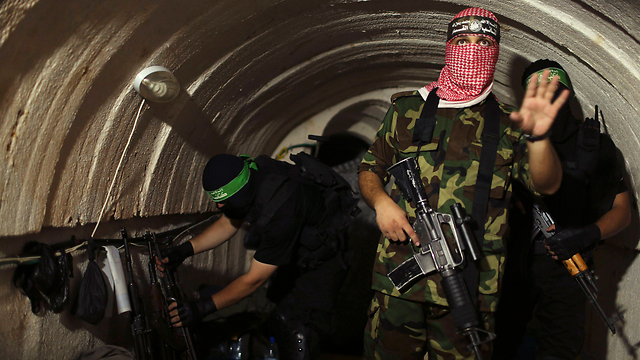
Hamas operatives inside Gaza tunnel – Photo: Reuters
Of the total Gaza budget, 70 percent was covered by the tunnel smuggling industry, but now 90 percent of the tunnels are no longer in use. This has nothing to do with the military tunnels dug along the border of Israel, but those situated along the Rafah border with Sinai, which were destroyed by Egypt with President al-Sisi’s rise to power.
The Gaza tunnels are run in an ordered fashion, with preset rates of taxation: NIS 20 for each ton of cement, 1.6 shekels for every liter of fuel and so on.
“But Hamas’ priority,” say the people of Gaza, “was to buy weapons, and not worry about the water and electricity infrastructure.”
Hamas took power in Gaza in the 2006 elections, running on a platform of fairness and transparency and criticism of the corrupt Palestinian Authority. Now the situation is reversed.
Bottles of water donated to the people of Gaza from their compatriots in the West Bank are sold on the street for a dollar per bottle. This is a huge amount for Gaza’s impoverished residents. The Fatah leaders who grew rich on the backs of the Gazans were replaced by Hamas officials who amassed fortunes for themselves.
The managers of the smuggling tunnels were making up to 100 thousand dollars a month. To dig the tunnels, children and adolescents were employed in conditions of slavery; 160 of the child workers have died in recent years due to tunnel collapses during construction. For the Gaza residents seeking a different future, the tunnels into Egypt that are still active are their only hope.
Dozens of them squeeze every day into the narrow entrances to the tunnels. Not because it’s the only way to earn something, everyone here is waiting in line to escape, to enter Egypt illegally and head for the ships anchored off Alexandria that smuggle immigrants to Europe.
Just last week there was a major disaster, when dozens of Palestinians died after their migrant ship was sunk apparently by the smugglers themselves after a quarrel broke out among them. Only a few survived, and the first bodies have already started to appear, floating off the coast of Italy.
But for now, at sunset, the Gaza beach looks beautiful. The wooden fishing boats, nets and rough sand. The ceasefire between Israel and Hamas officially expires in a week, at which time talks should resume. It is not certain that this will really happen, despite the announcements, but no one here seems to have any interest in restarting the fighting.
The Author:
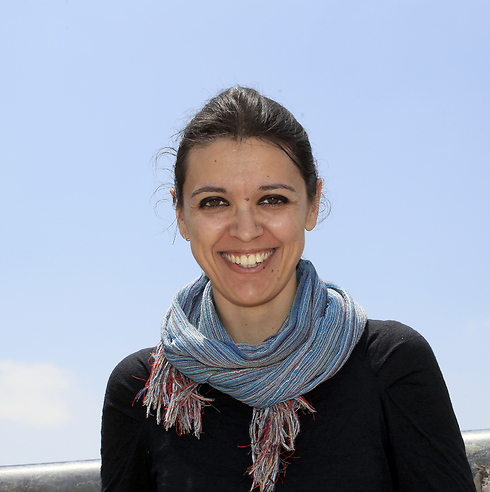
Italian journalist Francesca Borri – Photo: Haim Tzach
View original Ynet publication at: http://www.ynetnews.com/articles/0,7340,L-4573441,00.html







 Israeli New Shekel Exchange Rate
Israeli New Shekel Exchange Rate